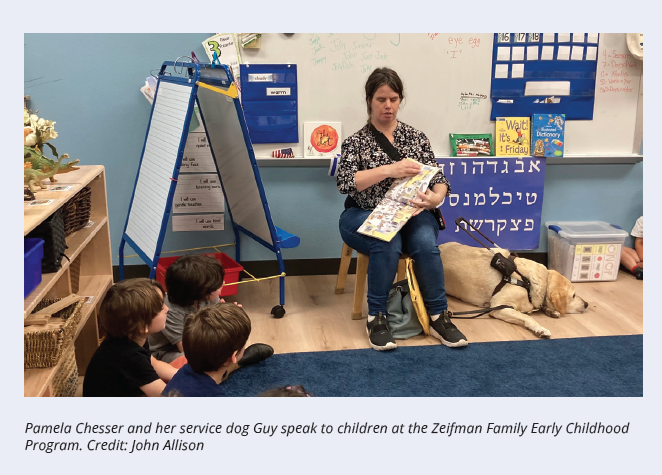
ECP Children Are Full of Questions for Some Special Visitors
Emily Shryock, director of the Disability Cultural Center at UT, and her service dog Maple speak to children at the Zeifman Family Early Childhood Program. Credit: John Allison
By Dana Baruch, ECP Faculty Mentor
One of the many blessings of Shalom Austin is the desire and ability for different branches of the organization to support one another. When Adam Hartman, disability and inclusion specialist at Shalom Austin Jewish Family Service, contacted Shereen Ben-Moshe, senior director of the Zeifman Family Early Childhood Program (ECP), about inviting a couple of visitors to the ECP to meet with the children, a beautiful opportunity was born.
In April, four ECP pre-K classes had the chance to meet two people with disabilities, along with their service animals. They met Emily Shryock, director of the Disability Cultural Center at UT, who is a wheelchair user and her service dog Maple, as well as Pamela Chesser, technical support manager, who is visually impaired and her service dog Guy. The children spent much of their morning learning about what it is like to have and function with these disabilities.
 Pre-K lead teacher Melissa Boaz shared that the children prepared for the visit by talking about their different senses and thinking about what questions they wanted to ask the visitors. She expressed the importance of children learning that people with disabilities are “just like everyone else, but they do things differently.” Shryock reiterated this point when she said to the children that she likes to be asked “HOW can you…?”, rather than “Can you…?” She brought her “regular” wheelchair as well as her tennis wheelchair—one of seven specifically purposed wheelchairs. She said her favorite is the one she uses to play rugby.
Pre-K lead teacher Melissa Boaz shared that the children prepared for the visit by talking about their different senses and thinking about what questions they wanted to ask the visitors. She expressed the importance of children learning that people with disabilities are “just like everyone else, but they do things differently.” Shryock reiterated this point when she said to the children that she likes to be asked “HOW can you…?”, rather than “Can you…?” She brought her “regular” wheelchair as well as her tennis wheelchair—one of seven specifically purposed wheelchairs. She said her favorite is the one she uses to play rugby.
Pre-K and 3’s lead teacher Ashley Stroud said, “It was a lovely experience for the children to have conversations with people who do things that we do, but maybe a little bit differently.” The children had many questions for both the guests such as, “Do you sleep in your wheelchair or in your bed?” “How does the dog know how to help you?” “How do you get dressed?” “How can you read if you can’t see the book?” Chesser shared her special computer that changes braille to English writing with the children. Five year old John said, “I thought the visually impaired person’s computer was cool. It turned her Braille words into words that people who can see can read!”
Another opportunity came through a connection made by Shalom Austin HR Director Ashley King who introduced the ECP to the Greenleaf Neuro-Diversity Community Center, a project of Easter Seals Central Texas. Greenleaf NCC is a non-profit organization that is a hub for people with autism and other neuro-divergent conditions. The organization helps participants develop friendships, social skills, workplace readiness and a sense of belonging, so they can reach their potential in the community, in the workplace and in life. During this spring and summer, ECP
will pilot a program that will bring several Greenleaf participants who will work in ECP classrooms with guidance and support from Greenleaf staff, as well as the ECP teachers.
According to Ben-Moshe, “At the ECP, we try to expose our children to a variety of people, in the hopes that they see that each of us is unique, we all have our own gifts, and that this teaches us to understand that we don’t all do things in the same way. In other words, we are all created b’Tzelem Elohim, in the image of G-d.”
Latest Posts
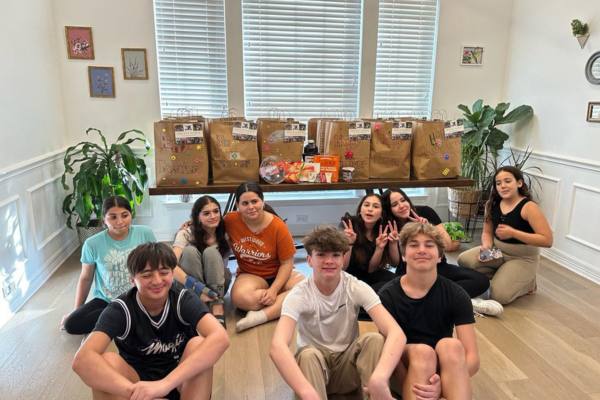
Baskets Of Hope
8th grade Israeli scouts. Credit: Gili Meidan By Shelly Shwartz Winston Churchill once said – “We make a living by what we get, but we make a life by what we give”. That prevailing feeling was felt last week, when 20 Passover baskets, prepared by the 8th-grade Israeli...
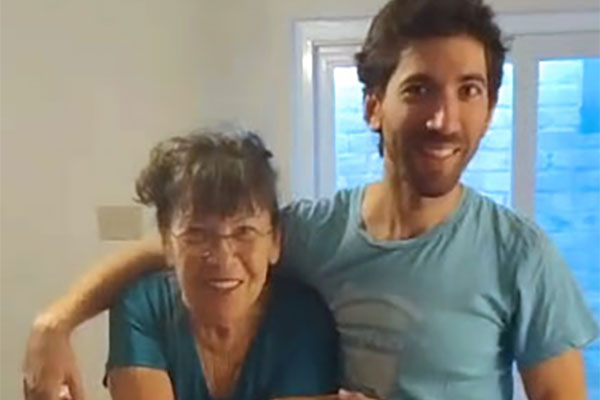
Shalom Austin Jewish Family Service Responds to Community Needs After October 7
Yuval Edrey and his mother. Courtesy: Yuval Edrey By Liron Ramon, Shalom Austin Jewish Family Service Case Manager In times of crisis, the strength of a community shines through in its ability to come together and support those in need. For Israeli families seeking...

Unlocking Your Mindfulness Practice
Step into a world where time slows down, and the noise of daily life fades into the background. Mindfulness and meditation are more than fleeting trends; they unveil timeless practices deeply rooted in ancient wisdom and contemplative traditions from Judaism, Buddhism...
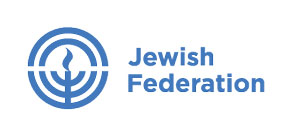
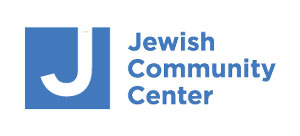
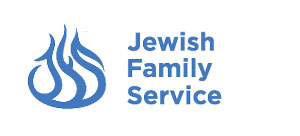
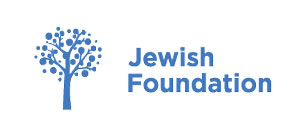
HEALTH & WELLNESS
Fitness
Swimming
Tennis & Pickleball
More Sports
EDUCATION
Jewish Culture & Education
Early Childhood Program Preschool
After School & Childcare
Camps
ARTS & CULTURE
Literary Arts
Visual Arts
Theatre & Film
Dance
COUNSELING & SUPPORT
Jewish Family Service
Counseling & Groups
Case Management
References & Resources
Copyright Shalom Austin 2023. Privacy Policy.
